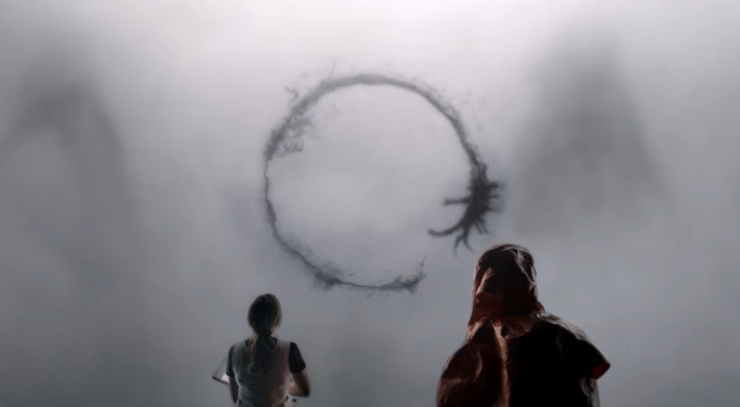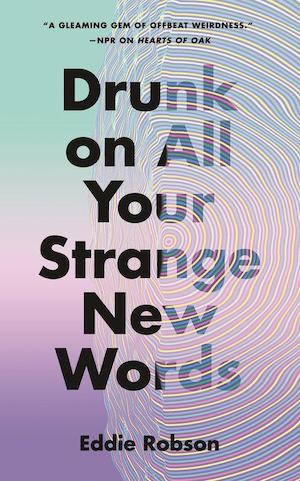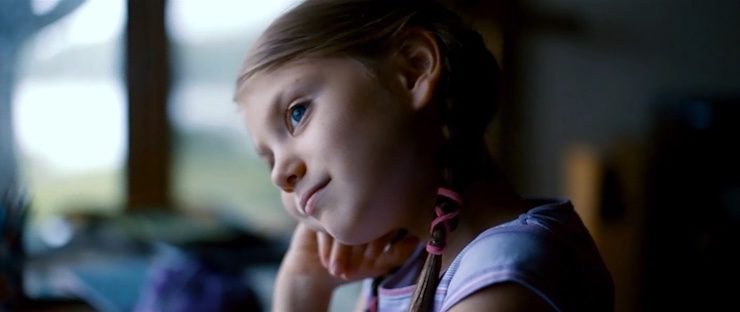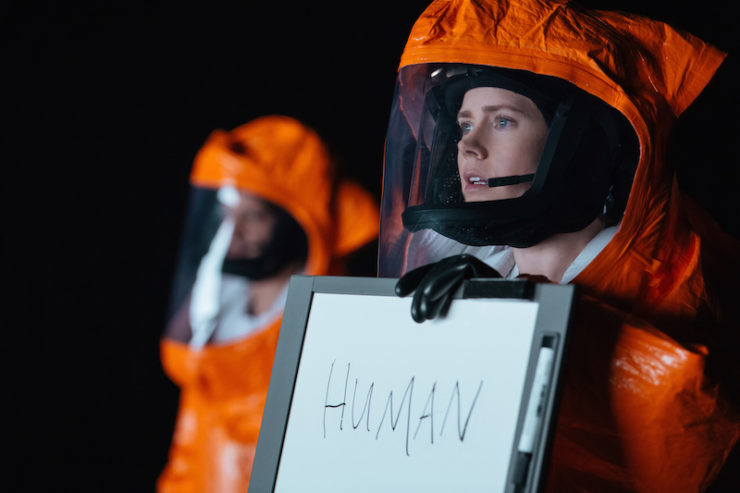At the risk of sounding self-indulgent, let me point out that film criticism is not born in a vacuum. Much as I try to keep myself “pure”—not reading reviews, not consulting PR synopses (at least before my first viewing), going all the way to tackling people who say they’ve already seen the film to keep them from revealing what they thought of it—I still go into a screening with expectations and prejudices. I carry my personal baggage wherever I go, and there’s a lifetime in every word I write—including, to radically paraphrase Mary McCarthy, “if,” “and,” and “but.”
Cognizance of where I’ve been steers where I’m going. If I feel that A Monster Calls (2016) is a grievously undervalued film, I can’t discount that that opinion may well have roots in a particularly devastating event in my own life. The question I’m obligated to confront is: Do I factor my personal biases into my reviews and temper my evaluation accordingly, or do I accept them as a part of the things that form me, and stand by my judgement? How much do I let cognizance of the past alter my present…and future?
The basic plotline of Arrival (2016) is simple enough: The Earth is visited by a fleet of alien ships, which park themselves, seemingly randomly, at various positions around the globe. Noted linguist Dr. Louise Banks (Amy Adams) and theoretical physicist Dr. Ian Donnelly (Jeremy Renner) are recruited by the U.S. government—represented primarily by Forest Whitaker for the military and Michael Stuhlbarg for the FBI—to enter the mammoth, featureless, and gracefully arced spacecraft in order to attempt communication with the seven-legged, mollusk-like aliens, dubbed heptapods. Their mission: figure out what, if anything, these visitors want from us.
Arrival is based on Ted Chiang’s Nebula-winning novella, The Story of Your Life. In its original incarnation, the action is intimate, focusing on Banks’ and Donnelly’s interactions with the heptapods via what amounts to an alien-created closed-circuit TV system. Director Denis Villeneuve and screenwriter Eric Heisserer broaden out the canvas, bringing the U.S. team into the ship for direct, face-to-wherever-their-faces-are encounters (separated by glass), and noting frequently that teams around the world are also struggling to decipher the heptapods’ intent. The broader scope allows Villeneuve to add a more cinematic conflict: A Chinese general who determines that the aliens’ mission is hostile, bringing the Earth to the brink of intergalactic war.
But for all the film’s epicness of plot—complemented throughout by Villeneuve’s visually stunning production—this is very much a personal story, seen through the eyes of Dr. Banks. And the message conveyed is not one of global consequence but of individual growth. The process by which that personal tale is told is a crucial key to why it lands with such impact.
[Please note that I’ll be discussing the events of the film in detail from this point on, so consider this a spoiler warning for anyone who hasn’t seen it.]

A bit of digression: It is understandable that discussion of director D.W. Griffith tends to center around how his Birth of a Nation (1915) is, undeniably, about as virulent a bit of racial hatred as was ever committed to film. (BTW: The condemnations started pretty much from the day of its release, just in case anyone is aching to scream, “Cancel culture!”) It’s unfortunate though, because the man was also an undeniably brilliant storyteller, one who pioneered many of the techniques that would become the cornerstones of narrative cinema. In particular, he discovered that if you intercut between events taking place in two different locations with two different sets of characters, the audience would automatically perceive that those events were taking place simultaneously. No need to track into a clock showing the same time; no need for title cards proclaiming, “Meanwhile…”—there’s something innate in the human mind that can grasp that concurrent events are occurring, even if they’re conveyed through alternating sequences.
Extending beyond that, here’s another little trick that relies on our innate understanding of filmic time: Imagine a sequence that starts out with a close-up of a character. Suddenly their expression alters, becomes detached; their glance shifts, as if seeing something off in the distance. Cut to a new sequence, with the same character engaged in some event, likely unrelated to the content immediately preceding it. Another cut, and we’re back to the close-up of the character as that person reengages with their surroundings and carries on.
Buy the Book


Drunk on All Your Strange New Words
Without even thinking about it, we automatically attach a word to what we’ve seen: memory. And we also know, somehow, that that memory has some relevance to the action at hand (unless the director is someone who just wants to fuck with our minds). We’re secure in the knowledge that we can recognize when a doorway into the past is opened, and that that glimpse into the before-time will eventually have impact on our understanding of the story’s present.
And it’s in our confidence in deciphering the basics of film language that Arrival throws us a curve, prompting us to consider how we view our own time on this Earth.
Arrival begins with a montage sequence exploring Dr. Banks’ life with her daughter, Hannah, tracking it from birth to the young woman’s untimely death due to disease. We see the good moments, the bad moments, the silly moments, and the moments of just being. The sequence ends with Dr. Banks walking, alone, down a hospital corridor, broken by her daughter’s passing. The film then picks up with the arrival of the heptapods, and Dr. Banks’ recruitment into the U.S.’s efforts to communicate with them. Throughout the rest of the film, the doctor occasionally flashes on moments with her daughter. But the more these sequences are invoked, the more we realize something is off. The returns to Dr. Banks at the first contact site will see her looking confused, or even disturbed, as if the images we’ve just witnessed are as new to her as they are to us. At one point, she even mutters in voice-over, “Who is this child?”—a big hint that what we think we’re seeing is not what’s actually being conveyed.
Turns out Villeneuve is playing on our presumption that what we’re observing is linear time. We watch the compressed, heart-rending tale of a woman losing someone she loves, and presume that when the tale picks up with her entering a near-empty lecture theater populated with a small clutch of very distracted students, we’re seeing one event naturally following upon the other; that in the aftermath of a soul-wrenching loss, Dr. Banks has picked up the pieces and carried on with her professional life. But as the film progresses, as we become acquainted with the heptapods’ cyclical form of writing and its significance in how they view time, it becomes obvious that Dr. Banks is not flashing back, but forward, improbably but potently seeing into her future.
Our instinctual understanding of film language betrays us. The clues keep getting dropped, but until we rewind what we’ve observed—another play upon cinematic time—we don’t realize how our presumptions have led us astray. Chiang does something similar in his novella, interleaving passages covering Dr. Banks’ encounters with the heptapods with those of her with her daughter, and uses a literary device to drop hints—the present-day events being told in past tense; the “memories” of the daughter conveyed in future tense. Villeneuve, unable to rely upon such grammatical luxuries, turns a disadvantage into a bracing advantage, making the discovery of what Dr. Banks is undergoing more organic. We learn with her, and as a result, the revelation alters our own perception of time.

The Story of Your Life is, at heart, a rumination of our ability to affect our own fates. “…(K)nowledge of the future was incompatible with free will,” Dr. Banks muses at one point; at another, “The existence of free will meant that we couldn’t know the future. And we knew free will existed because we had direct experience of it.” Villeneuve acknowledges the contradiction in his film, but challenges the concept by allowing the tale to take two paths. In the newly-added global conflict plot, Dr. Banks’ knowledge of the future allows her to alter her present, and avoid the war. But knowing everything she does about what will happen between her and her daughter—including the dissolution of her marriage with Donnelly (in the novella due to his infidelity, in the film, much more compellingly, because she reveals to him what she’s always known)—she decides to follow the path that time has laid out for her. “Despite knowing the journey, and where it leads, I embrace it,” she says.
And, yes, there’s a contradiction in portraying the surrender of free will as an act of free will. (All time travel stories have paradoxes…did you think Arrival would be immune?) But where Chiang addresses the issue as a conceptual one—Dr. Banks, having had her perception of time altered through her interactions with the heptapods, yields to the change and resolves to keep it secret—Villeneuve finds a more human motivation for such a decision: That nothing happens in a vacuum, that who we are and who we are to become is an amalgam of the good and bad and everything in-between. For Dr. Banks to forgo tragedy is also to forgo love and happiness, and the potential for the latter two makes the first worthwhile. None of us have the capacity to look into the future and see where we will come out—or if any of us do, they’re keeping the secret close to their chests (just in case, if any of you are reading this, can you tell me if the Avatar sequels merit the time it’s taken to create them?), but we can sort out our past and gauge whether all that we celebrate and endure has been worth the turmoil.
The whole “je ne regrette rien” thing is easy enough to adopt when your life overall has been pretty damn sweet (as, gratefully, my own has largely been). But if in the end we find ourselves grown and fulfilled, can we dismiss what part the worst moments had in making us who we are? Arrival posits Louise Banks’ brilliance in her abilities as linguist, but goes on to observe how that wisdom extends to an understanding of what it takes to be fully human. We are the sum components of all our experiences, and if we are better people for that, then we’d be fools to change one second.
* * *
This was my third or fourth viewing of Arrival, and I could probably go on to watch it another forty-six or forty-seven times, so rapt am I with its visual virtuosity and the potency of its message —if this film isn’t destined for classic status, I don’t know what is. But I can understand if some people can’t help but look askance at its moral; there are those who, being given a chance to alter their fate, would for good reason embrace the opportunity without a second thought. What do you think? Am I putting too smiley a face on a complex issue? Is there a film that offers a counter-argument to Arrival’s blissful acceptance of a life fully lived? You’ve got the comments section below to express yourself. Remember to keep it friendly and polite, and tell me what you think.
Dan Persons has been knocking about the genre media beat for, oh, a good handful of years, now. He’s presently house critic for the radio show Hour of the Wolf on WBAI 99.5FM in New York, and previously was editor of Cinefantastique and Animefantastique, as well as producer of news updates for The Monster Channel. He is also founder of Anime Philadelphia, a program to encourage theatrical screenings of Japanese animation. And you should taste his One Alarm Chili! Wow!










